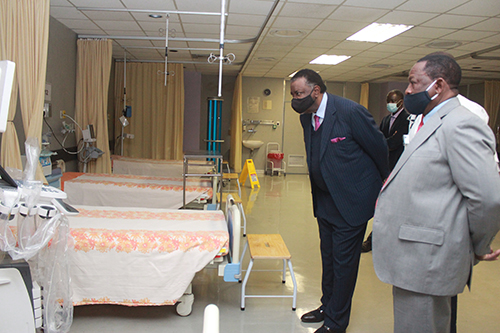Loide Jason
Health authorities have acknowledged that the outbreak of the dreaded Covid-19 pandemic has ultimately proven to be a blessing in disguise for the country’s health sector, despite its horrific implications on the economy.
As soon as the first Covid-19 case was reported in March 2020, the nation went into overdrive to battle this unknown enemy.
The government immediately set up elaborate measures and infrastructure to successfully curb the spread of the virus and similar onslaughts in
future.
As cases began to rise, borders were secured and the country was put on lockdown, which led to an economic downturn as more employers started to retrench workers to save their institutions from completely closing down.
Covid-19 has in under two years killed over 3 900 Namibians, but was the catalyst for large-scale investments and improvements in both the public and private health sectors.
The pandemic created an opportunity for government officials and the private sector to look inwards to better develop the nation’s healthcare system.
Ministry of health executive director Ben Nangombe said the Covid-19 pandemic has tested Namibia’s public healthcare systems as it exposed weaknesses, gaps and inequalities, but also some potential solutions.
“The challenges presented by the pandemic were an opportunity for our health systems to move beyond our current limitations. Sharing knowledge and skills has proved to be an effective way to use scarce resources across the country during the pandemic to strengthen our health systems,” he observed.
Nangombe said although lives and jobs were lost, the health sector has benefitted massively during the pandemic as a substantial amount of money was spent to capacitate the Namibia Institute of Pathology (NIP) to conduct tests.
“The government increased bed capacity throughout the country. We only had 16 intensive care unit (ICU) beds in public hospitals countrywide, but now we have completed 90 beds and will bring 114 more, bringing us to 297 ICU beds in the country. The former building of the NIP at the Windhoek Central Hospital was repurposed and converted into a 46-bed ward for Covid-19 patients. This is in addition to the 74-bed Old TB Ward, the conversion of 4A into a 64-bed ward and the repurposing of 5A into a 34-bed facility, all at the Katutura state hospital,” he added.
“The construction of a 98-bed ward at Katutura hospital is finalised. The expansion of hospital beds, oxygen supply and mortuary space has been done at all hospitals around the country.”
Deliberate steps have also been taken to improve the supply and availability of life-saving oxygen to health facilities.
“We recruited 1 800 personnel countrywide. We strengthened the mortuary, and many more. Now, we have an upgraded health system,” he commended.
“A 20-ton bulk oxygen tank was installed to provide oxygen to the 74-bed respiratory unit at Katutura Hospital. We have increased our healthcare workers in the country. We had trained more people who are capacitated to deal with the pandemic,” Nangombe said.
NIP capacitated
Meanwhile, NIP CEO Kapena Tjombonde said the Covid-19 pandemic has transformed the landscape of molecular pathology or genetic testing in Namibia in a matter of months.
“NIP now can conduct molecular testing for viral and bacterial pathogens other than SARS-COV-2, across the country. Before the pandemic, most molecular pathology samples were referred to South Africa,” she added.
“As a national laboratory service provider entrusted with the public health mandate, the capacity that NIP has built places it in a better position to respond swiftly to future public health emergencies by providing laboratory results to policymakers expeditiously.”
Tjombonde added that with the Covid-19 outbreak, NIP learned invaluable lessons and tactics that will be beneficial for the future, such as being agile, responsive and remaining grounded.
“With the launch of our NIP Research Trust Fund, we will be researching the pathology and diseases. Now, more than ever, we must fast-track the medical research agenda to add to the body of knowledge,” she said.
“We also hosted a virtual conference on the ongoing lessons from the Covid-19 pandemic in the healthcare sector. The virtual conference echoed the importance of investing in medical research, for scientists to capitalise on advancements in technology, and answer some of health’s difficult questions such as finding relief from Covid-19 through vaccines and other means. The conference attracted over 120 participants.”
Tjombonde said during the pandemic, collaboration and teamwork across various institutions was a big positive as Namibia came together in the fight against Covid-19, evident in the coordination of financial and human resources.
“Covid-19 has improved our income and yields between 10 – 15% of NIP’s overall revenue. It is also worth mentioning that through the increased Covid-19 revenue, NIP was able to invest in the Covid-19 testing expansion at strategic areas,” she continued.
The institution furthermore strengthened its testing capacity from the initial 100 samples to 1 500 samples a day.
“We also strengthened our molecular testing capacity by training and upskilling our staff. NIP expanded its testing capacity, with services available at strategic locations, namely Windhoek Central Reference, NIP Windhoek private, Oshakati, Rundu, Keetmanshoop, Katima Mulilo, Swakopmund, Walvis Bay and lately Gobabis. NIP boasts a network of nine laboratories, with some offering PCR and/or Antigen Rapid Testing with a turnaround time of three to 24 hours,” she explained.
Since 2020, NIP has invested about N$120 million to handle Covid-19 testing. The investment is apportioned to human capital costs, Covid-19 testing expansion to strategic locations, personal protective equipment (PPE), reagents and laboratory consumables.
Caption: (Pandemic 1, 3 and 4)



